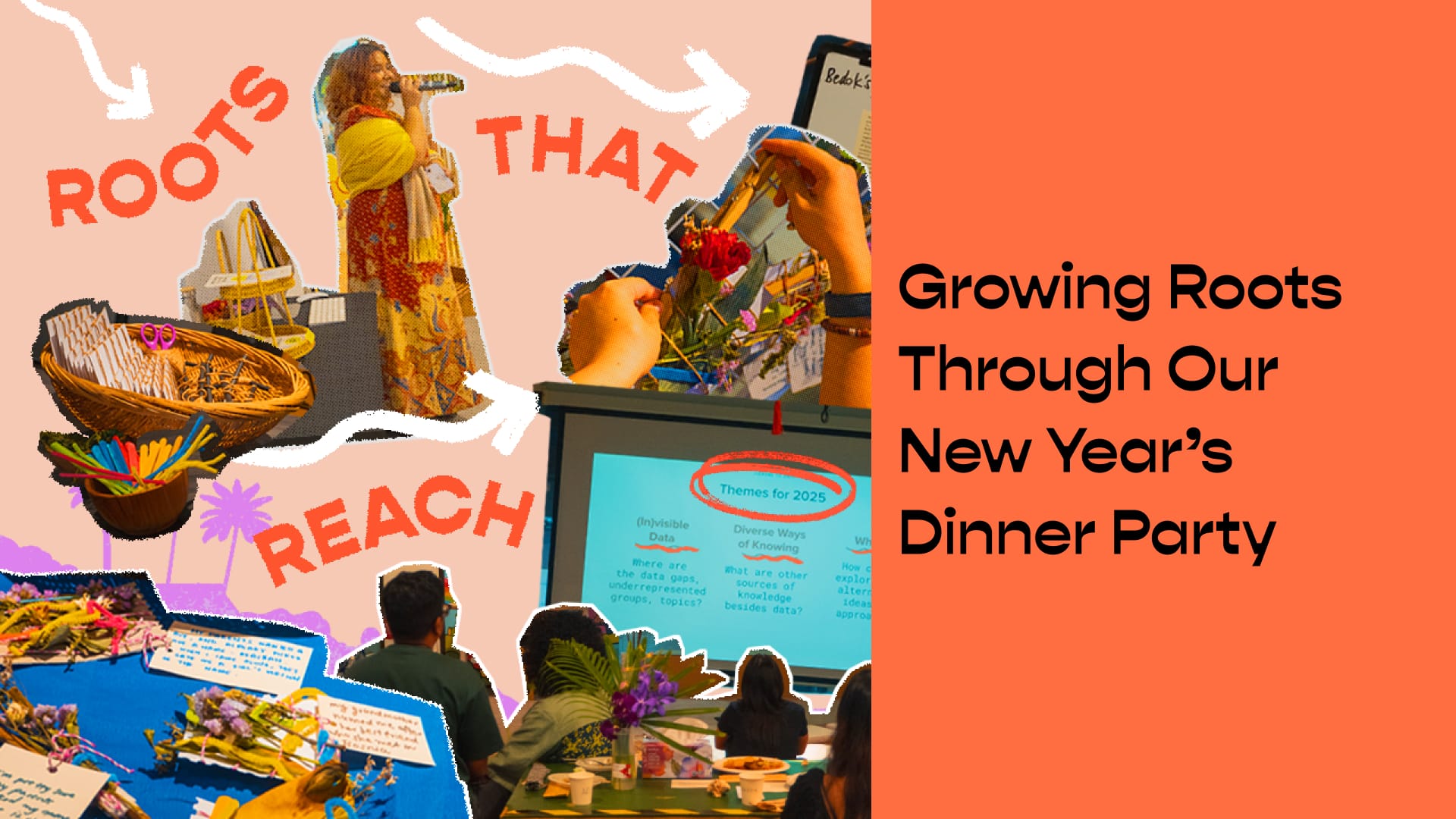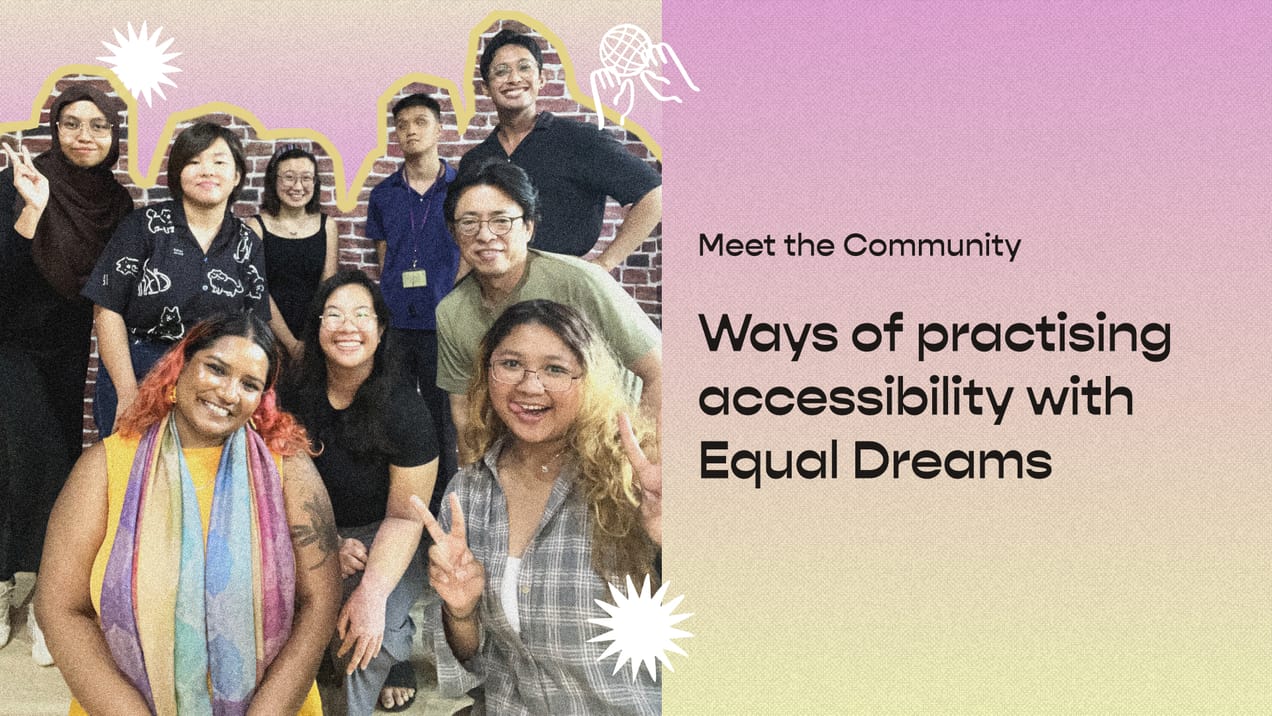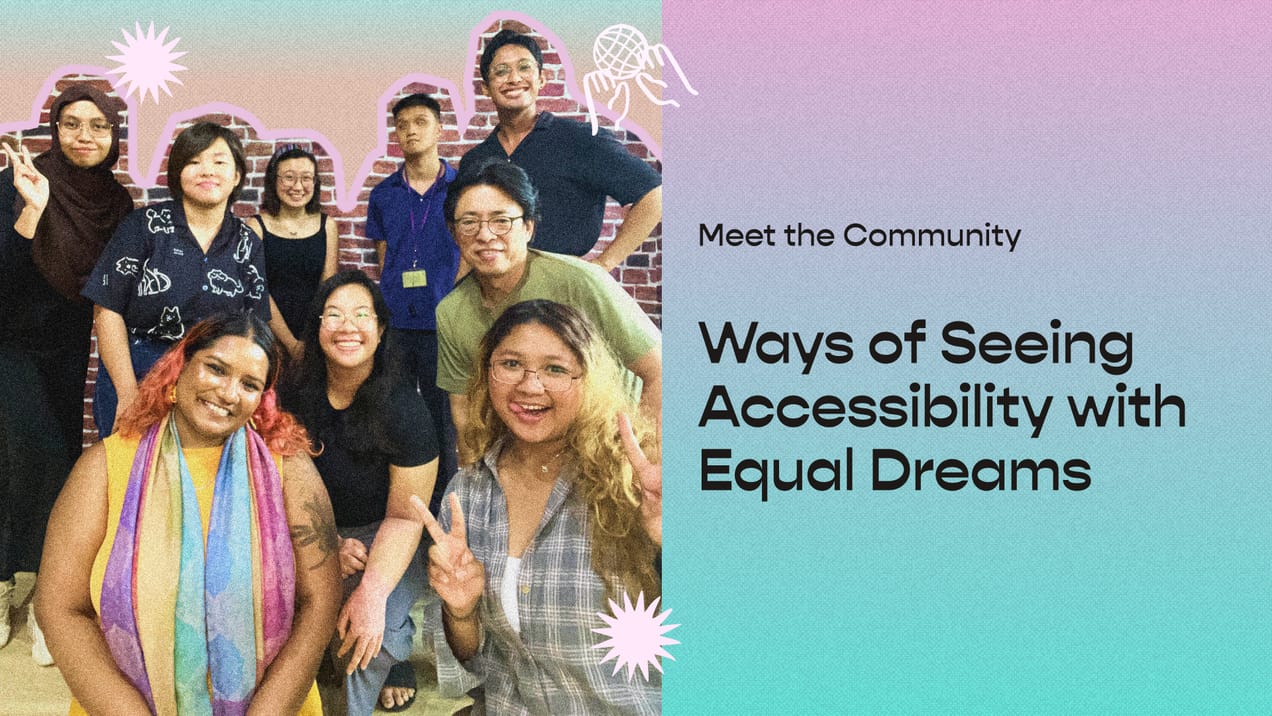
Growing Roots Through Our New Year’s Dinner Party
This past January, we hosted our new year’s dinner party, which has now become an annual tradition. When we organised the first one in 2023, we had wanted to gather our community in person for the first time at our office. As an organisation whose work—and, for that matter, interactions with one another—mostly lives online, these rare moments to enjoy each other’s presence are precious. They’ve quickly become one of my favourite parts of the job. For this year’s party, we wanted to go back to our roots, which includes paying homage to Bedok, the neighbourhood our office is part of.
To understand why this was important, we have to share more about what the Kontinentalist team has been busy with over the last year. For those of you who are not aware, Kontinentalist debuted our new mission and vision recently. We felt that our old mission and vision no longer fully encapsulated our evolving values (you can read more about our thinking here), and came up with a new one: “To advocate for a more equitable world that fosters connections between Asia’s sources of knowledge. We nurture community around data and human experiences.” We feel this better reflects our desires to facilitate meaningful, equitable connections between people and honour various, often-overlooked Indigenous and local knowledge forms across the region.
Alongside this, we’ve been fleshing out a renewed decolonial methodology that prioritises non-extractive, ethical ways of working with communities and partners in data storytelling. As a data storytelling studio that relies heavily on research, we’ve come to recognise that we often inherit harmful legacies. Research has historically been used as a tool of imperialism, as described by Linda Tuhiwai Smith, the Indigenous scholar and writer whose work on decolonial methodologies has been instrumental for us. Part of this new direction also means learning how to attune ourselves to our immediate environments, and grounding our research in the lived realities, knowledge systems, and relationships with land that are unique to each place and its communities.
For us, one of those places is Bedok, where many of us in Kontinentalist spend our days crafting and working on the stories we tell. Bedok is a place rich in Indigenous histories of coastal communities. This also means acknowledging histories of dispossession, forced migration, erasure, and resistance tied to this land. Without that recognition, our research risks repeating the patterns of colonial extraction. So when we began brainstorming for this year’s dinner party, we knew we wanted to centre Bedok.
Our research revealed that coconut palms once flourished along the coastal stretch from nearby Upper East Coast Road to Bedok, and continue to be an enduring image associated with the area. One thing that struck me about this specific species of tree is how rare it is to find an uprooted palm. Even though the soil near the coast is often unstable—causing them to lean, sometimes dramatically—their roots hold strong. We thought this was the perfect metaphor for our new direction: staying rooted in firm principles, the contexts we come from, and the indigeneity of the lands we are part of, while also reaching outward toward diverse knowledge systems across the region.“Roots That Reach”, the theme for our New Year’s Dinner party this year, thus felt like a fitting homage to both the groundings we were returning to, and the possibilities we are discovering. And what better way to celebrate that than with a dinner party surrounded by our community?
We even set up a small exhibition to honour Bedok’s history—which extends from discussions about Bedok’s history and how it has evolved, which we had as part of a countermapping exercise at last year’s Creating Narratives for Change Festival. For the dinner, we invited guests to respond to this history by contributing their own reflections using sticky notes and stickers, turning the space into a living conversation. We asked questions like, “What are memories of Bedok that make you feel a sense of belonging?”. One guest shared that they had once worked as a part-time librarian at the old Bedok Library, which is now the Common Ground Civic Centre, where our office sits. It was a beautiful moment of realisation: that people at our party didn’t just share in our story of Bedok, they were already part of it, and in some ways, co-creating it with us.
Of course, a dinner party’s heart is its food. Like last year, it was important to us to support small, home-based businesses, rather than buy from a big chain or business. This included Teh Tarik Boi, which is run by Fazly, a friend of Common Ground. (His roti kirai, a lace-like crepe eaten with curry, were such a hit last year!) We also ordered a variety of Indonesian dishes from Tumpeng and Such, such as sambal goreng—which typically uses potatoes instead of tofu, unlike its Malay counterpart—and ayam bakar, a popular grilled chicken dish.
Not only did we cater to different dietary needs, we also wanted the menu to reflect Indigenous, local, and regional foods from across the region and beyond. So we were thrilled to be able to serve Bubur Lambuk Ikan Tenggiri, a family recipe from Firdaus, the founder of Orang Laut SG, passed down to him through his mother and aunt. Made with seasonal ikan tenggiri (mackerel), lemongrass and black pepper, this specialty porridge was both an homage to the rich culture of the Orang Semakau from Singapore’s Pulau Semakau, and a continuation of our long-term partnership with the organisation. For decorations, we used recycled materials, fruits from the local market, fresh flower arrangements, and banana leaves.
We also wanted to honour the decolonial thinkers and writers who we’ve been reading about in our monthly decolonial reading sessions. Our sources ranged widely: Raffles Renounced: Towards a Merdeka History, The Feminist Data Manifest-No, Braiding Sweetgrass, The Food of the Singapore Malays, the song Aku Melayu Di Kota Inggeris, AO3 fanfiction essays, and more. We placed quotes from these sources on tables and walls, even improvising an exhibition at the entrance which greeted guests as they arrived.
We designed a data physicalisation activity connected to our theme. Last year’s activity was a data portrait that took the form of a kuih lapis, or layered cake, where each layer and its toppings reflected the attendee’s relationship with Kontinentalist. We wanted to do things differently this year. Instead of providing a prescriptive set of questions and answers, we wanted it to be more open-ended and reflective.
We created an activity called “In Your Nature”, where participants could use flowers, leaves, and plants to create a weaving or mini bouquet that reflects who they are as people, and the communities that have shaped them. For example, the use of different colours corresponded to how their communities formed closer bonds (green = practising rituals, pink = doing new things, etc.), and the number of leaves indicated the number of languages shared with one's grandparents.
Keeping sustainability in mind, we opted to collect unwanted plant trimmings from florists in Bedok. We met very kind shopowners who willingly gave us their trimmings, and to express our gratitude, we bought flowers from them for the party’s decor. We also foraged for branches and leaves near our office and homes.
It was really fascinating to see the different responses and stories. Some weavings and bouquets were more colourful than others, and it was really heartening to see guests interact and share stories with one another. It became a space for reflection and quiet conversations, and somehow evolved into an introvert’s corner, which was much appreciated by some.
This year’s attendees came from a wide variety of backgrounds, which included readers, partners, friends from other organisations, journalists, artists, heritage workers, and more. What struck us was how many were also engaging with questions around decolonisation in their own work. Throughout the night, we had rich, thought-provoking conversations, many circling around the same question: What does decolonial work really look like in practice? Not just in theory, but in the day-to-day realities of our work, relationships, and the structures we’re navigating.
Some guests spoke about the tension between research and funding—how to build equitable relationships with communities, especially when they are vulnerable or marginalised. Others reflected on how to operationalise values like care, consent, and reciprocity in their work. We also had curious conversations with readers about our evolving direction. While many were excited about future collaborations and our expanded focus beyond stories on our website and social media, a few shared their attachment to our data stories and wondered if this shift meant we were leaving those behind (don’t worry, we’re not!).
These conversations showed that many of us are wrestling with the same questions, and that maybe figuring out how to live our values won’t be a solitary journey, but a communal one that will unfold over time, through practice, trial, and dialogue.
Putting together this year’s party felt like an exercise in learning how to lay down and tend to our own system of roots. Much like the coconut palm, which doesn’t rely on a single deep taproot but instead grows a dense network of thin, fibrous roots that spreads outward for strength and stability, our community and our work are held up by many connections. The night felt like an amalgamation of histories, stories, and relationships that reached across space, time, and communities, reminding us of where we come from, and the various ways we hope to grow with our community.


